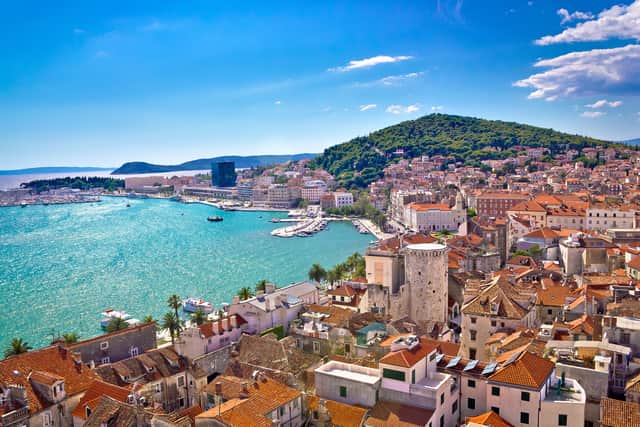Where can I travel without a vaccine? Countries allowing unvaccinated passengers - and entry requirements
and live on Freeview channel 276
Proof of vaccination status against Covid has become a standard entry requirement for most countries across the world as part of ongoing restrictions.
Many destinations will only allow travellers who are double jabbed against coronavirus to enter, while some now require a booster dose for travellers’ vaccination status to be considered valid.
Advertisement
Hide AdAdvertisement
Hide AdTransport Secretary Grant Shapps noted that having two doses of the vaccine is currently enough to be categorised as fully vaccinated in the UK, but has warned a third jab is likely to be needed in the future.
He said: “Increasingly countries elsewhere are requiring the booster for you to go there.
“So an important message for people, particularly perhaps younger people who maybe think ‘Oh, I haven’t bothered with the booster, I’ve been jabbed but I haven’t bothered with the booster’, get the booster because this summer, from talking to my counterparts around the world, in Europe and elsewhere, if you want to travel, say go to Spain on holiday this summer, they are almost certainly going to require that booster jab.
“So you want to get that.”


Despite Covid travel rules still being in force is most countries across the world, some destinations have not yet made it mandatory for visitors to show proof of vaccination to enter. Instead, travellers only need to show a recent negative test or a certificate of coronavirus recovery.
Advertisement
Hide AdAdvertisement
Hide AdListed are eight countries that are currently allowing travellers to visit without a vaccine and the entry requirements visitors will need to follow.
Greece
Unvaccinated travellers can enter the country providing they can:
- show proof of a negative PCR test taken within 72 hours before arrival, or
- show proof of a negative rapid antigen test from an authorised laboratory taken within 24 hours before arrival
Arrivas may also be asked to take a rapid test on arrival in Greece and must self-isolate in a quarantine hotel if the test is positive.
Croatia
UK travellers who are not fully vaccinated can gain entry to Croatia if they can present one of the following documents on arrival:
- a negative rapid antigen test not older than 48 hours, or
- a negative PCR test result not older than 72 hours, or
- a doctor’s certificate of recovery from Covid-19
Advertisement
Hide AdAdvertisement
Hide AdChildren under 12 and accompanied by a parent or guardian are exempt from these requirements if the parent or guardian has one of the above documents.


Cyprus
Travellers who have not been vaccinated or do not hold a valid vaccination or recovery certificate, regardless of nationality, are eligible to travel to and enter Cyprus from any country of departure.
It is a requirement for all unvaccinated travellers to instead show certification of a negative result from either:
- a laboratory Covid-19 test (RT-PCR) taken 72 hours prior to departure, or
- a rapid antigen test taken 24 hours prior to departure.
Those under the age of 12 are not required to present a negative PCR or rapid test certificate.
Advertisement
Hide AdAdvertisement
Hide AdAll travellers aged 12 and over who do not hold a vaccination or recovery certificate must present their test result in printed or electronic form.
Results from self-administered tests are not accepted for travelling to Cyprus and travellers may be asked to take a further test on arrival. Refusal to comply will result in having to quarantine at your own expense.
Turkey
All travellers visiting Turkey must complete an online entry form a maximum of 72 hours prior to travel.
Those who are not fully vaccinated will need to show proof of a negative PCR test taken no more than 72 hours before entry, or a negative rapid antigen test taken no more than 48 hours before entry.
Advertisement
Hide AdAdvertisement
Hide AdAlternatively you can show proof of recent recovery from Covid-19 within the last six months to enter Turkey. Travellers will need evidence of a positive PCR test taken more than 14 days and less than six months ago, and will not need to take an additional coronavirus test.
Travellers can use the NHS Covid Pass to demonstrate proof of recovery.
No PCR test or vaccination certificate is required for children aged 11 and under.
Portugal, Madeira and the Azores
Unvaccinated Brits can enter Portugal, Madeira and the Azores with proof of a negative Covid-19 PCR or rapid antigen test result certificate on arrival (except children aged 11 or under).
The tests must meet the following criteria to be accepted:
- all tests must be carried out by trained healthcare professionals. Self-administered tests are not acceptable
- antigen tests must be completed within 48 hours of departure. They must meet the standards set out in the EU common list of Rapid Antigen Tests
- RT-PCR tests must be completed within 72 hours of departure
Advertisement
Hide AdAdvertisement
Hide AdThe test certificate must also contain the information set out in Annex II of the EU common list of Rapid Antigen Test, including:
- your name, date of birth and passport number
- the type of test taken and the date and time the sample was collected
- the date of the result and the name of the testing facility or centre and responsible clinician
Travellers should not use the NHS testing service to get a test in order to facilitate travel to Portugal, and must instead arrange to take a private test.
Mexico


Holidaymakers from the UK must complete a health declaration form and scan the QR code it generates on arrival in Mexico.
At the moment there is no requirement to provide a negative PCR test or quarantine on arrival, but some resorts may ask guests to complete health questionnaires.
Advertisement
Hide AdAdvertisement
Hide AdCustoms officials may also ask to see proof of accommodation booking or contact information while you are in the country.
United Arab Emirates (UAE)
Travellers from the UK and arriving in the UAE must show proof of a negative Covid-19 PCR test before departure and present this certificate at check in.
The PCR test needs to be taken no more than 48 hours prior to departure.
As of 26 February, unvaccinated travellers from the UK to Dubai may be required to take a PCR test on arrival.
Advertisement
Hide AdAdvertisement
Hide AdAnyone who tests positive, depending on symptoms and accommodation plans, may be required to self-isolate in a government facility, a hospital, their hotel or privately arranged accommodation for at least 10 days.
If you are not fully vaccinated, you must take a PCR test 48 hours before entering Abu Dhabi and it is optional to take a PCR test on arrival at the airport. You may not be permitted to enter public places in Abu Dhabi if you are not fully vaccinated.
Slovenia
All travellers visiting Slovenia must complete a Digital Passenger Locator Form 24 hours before arrival via an airport or ferry terminal, after which they will receive a QR code which must be shown to the Border Police on entry.
The form is not required if entering overland at a border crossing.
It is no longer a requirement for any travellers to present proof of vaccination or a negative Covid-19 test to enter Slovenia.
Comment Guidelines
National World encourages reader discussion on our stories. User feedback, insights and back-and-forth exchanges add a rich layer of context to reporting. Please review our Community Guidelines before commenting.
